The hippopotamus has earned itself a reputation of being the deadliest land mammal of Africa.
Possessing the largest mouth among all land animals these gigantic beasts cause the death of about 500 men per year.
Truly speaking a full-grown adult could be squashed by a giant charging hippo & still it wouldn’t make any difference to them. So if you being a tourist see this remarkably agile giant presenting signs of hostility you need to start planning immediately.
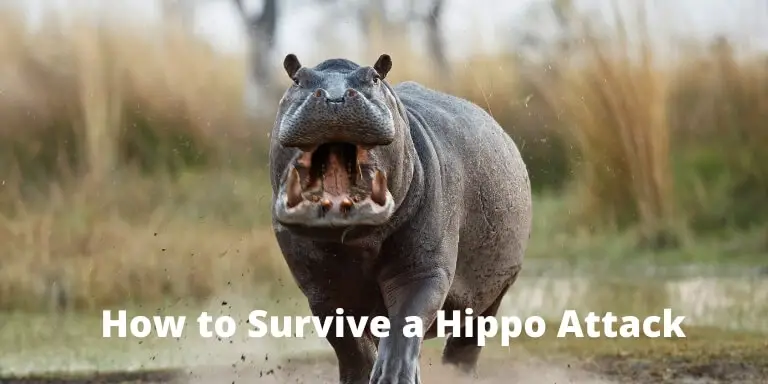
Hippo basics you should know as a foreign tourist
Size
The word Hippopotamus introduces us to a humongous semi-aquatic cow figure with reddish skin & tiny legs. It may take a hippo calf about 5 to 7 years to be fully grown as an adult. They’re considered to be the third-largest land mammal on earth right after elephants & white rhinos. The male hippos can weigh up to 4500 kilograms & the females can weigh up to 1400 kilograms.
Speed
Despite their hefty size, these beasts are remarkably fast. An adult hippo can run as fast as a speeding horse (from 0 to up to 40 mph) within the blink of an eye. That is around the average speed of Usain Bolt!
You don’t want to see what comes next of a huge mass of flesh charging with such velocity. It is simply impossible to outrun these speeding beasts on foot.
Diet
Hippopotamuses are often mistaken to be considered peaceful herbivorous animals that keep to themselves. Tender small grass is the first thing on their favorite food list. They also love vegetables & eat a lot every night. The locals often talk about hippo’s unusual set of killing skills. They’re often seen to hunt impalas, kudus & even buffalos.
Behavior
Though they are pictured mostly playing & goofing around the muddy river during daytime, that is never the big picture! After sunset, they can graze up to more than 5 to 6 miles daily in search of food. The vegetable farmers of Kenya have to constantly watch their backs from disastrous hippo attacks.
Hippos love water. They spend somewhat of 16 hours per day playing, bathing & submerging in it. This means invades could arrive from under your feet also!
Five things that induce Hippos to attack
Now let’s talk about the burning question of all tourists, why are these cute-looking massive blobs so dangerous? Despite being a herbivorous animal, at times Hippopotamus can show massive aggression toward humans.
1. They are immensely territorial in nature:
These wild animals are extremely territorial & very easily startled. One should never sneak up on a hippo. It is only instinctive of them to protect their land. Hippos can also get scared if boats or kayaks get too close.
2. They are in love with water:
Hippos like to have a firm grip on both their water & land areas. They are easily triggered if they find suspicious movement between the river & themselves.
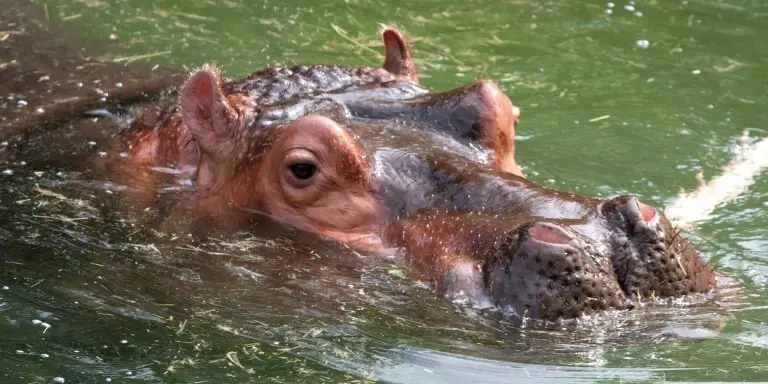
3. They posses the biggest jaw on land:
The hefty animal can open its jaw up to a crazy two right angles. That is 180 degrees. The bite force is more than ten times stronger than any adult human being. Those massive canines of theirs could even pierce a full-grown crocodile like a plushy tomato.

4. They love their children:
The females can become hostile if the safety of their calf is threatened. Studies estimate that between 29% to 87% of hippo attacks are fatal.
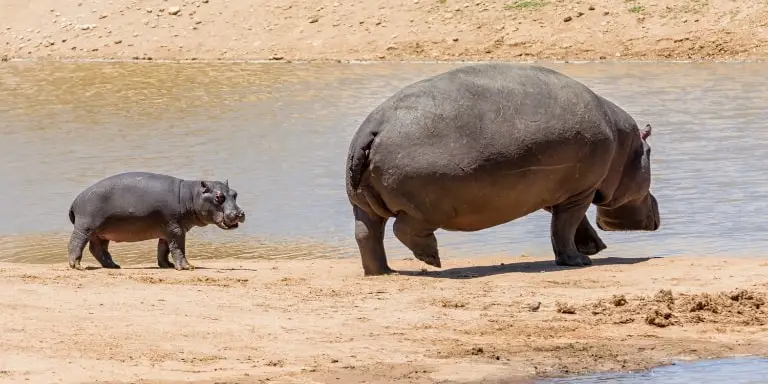
5. They use their vast size in their favor:
It is pretty much confirmed that no predator on land isn’t going to try to shove something down its throat of that volume! The vastness of their bodies makes them immune to any predator attacks. As a result, they can stop worrying about defense & can effortlessly coexist with the deadly African crocodiles.
Red Flags that you must avoid
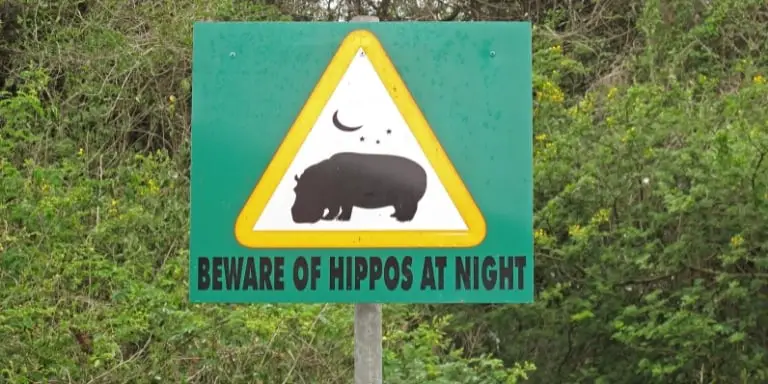
The Hippopotamus is not the sort of animal that you may encounter as suddenly as snakes or venomous frogs or insects. So the warning signs presented to you in the wild would be easy to notice.
- At night avoid the path that shows clear signs of hippo grazing.
- Abandon camping near the area with hippo wastes & footprints around.
- Try not to get between the hippo & the water. Hippos hate that.
- Never do anything to startle a hippo from upon close. Hippos are sensitive animals.
- Avoid canoeing & kayaking in shallow lakes. Hippos do not swim, they simply run along the ground under the water. So taking your boat ride in deep waters would be a smarter choice.
- Don’t even think of going near the calves. An angry mother is the last thing you want to face.
- If a hippo is noticed opening & closing its mouth (or yawning) with its head held upwards, turn around & leave the place immediately. Yawning is a massive warning sign of invasion of personal space.
- Avoid Hippo males fighting even if they’re quite a distance away.
Five things you must know to survive a Hippo encounter
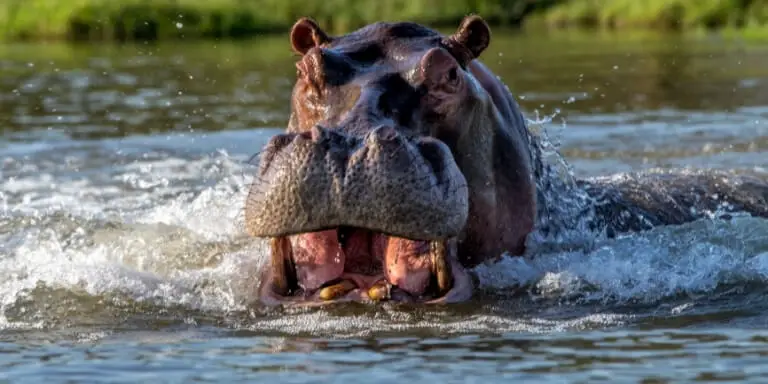
It would be the smartest if the wild beasts can be avoided before they can attack. But anything can happen in the wild. Suddenly you see a hippo bull charging towards you.
1. Check the water before a boat ride: Most of the attacks during the daytime occur in the water. The hippo simply sneaks under the boat & pushes it skywards with immense force. So if a hippo family is seen anywhere near while you’re on a boat, it is smartest to turn the boat in the opposite direction.
2. Make loud noises: Unfortunately, if you find yourself in a hippo-infected area keep a firm distance & make loud noises to gain attention. While doing so wave your hands high so that they can know that you’re holding your area.
3. Get on higher ground: The last thing you want to face is a charging hippo.
This angry beast can easily outrun your tiny human feet. So run in a zigzag pattern. Use his weight against him. Get on a tree or a termite. Or run up a hill if possible.
4. Don’t lose hope: In such a deadly crisis your strong will can carry you a long way. Paul Templer, a hippo attack victim speaks from personal experience. Mr. Templer, being a tourist guide, was on one of his sessions with his clients on the Zambezi river.
Suddenly a bull hippo appeared on the scene & plucked him out of his canoe. This man was in the mouth of the hippo 3 times. Though lucky enough to be rescued, Mr. Templer lost his left arm.
5. Worst case scenario: No such case was reported of a man being eaten by hippos. But that doesn’t mean it can’t crush you into a pulp. Suddenly you discover yourself in a hippo’s mouth then what? The goal is to make the animal as uncomfortable as possible. Seize anything in its mouth so that it may let you go. The next thing you should do is the dash in the opposite direction.
Conclusion
Hippos provide important elements to the aquatic ecosystem of Africa. The beasts are protected by enforcing laws. It is best to only observe the wild animal from a safe distance during a safari. Just try not to get too close & return in one piece.
